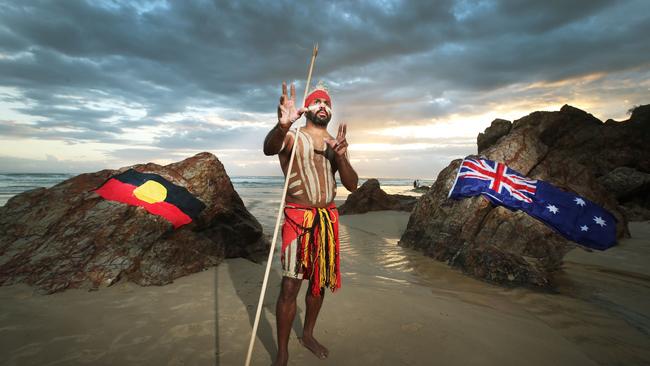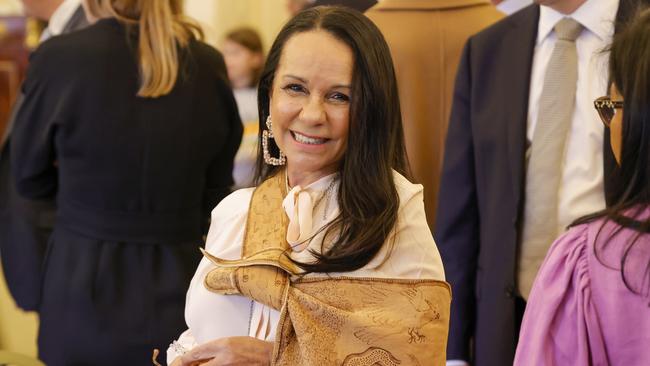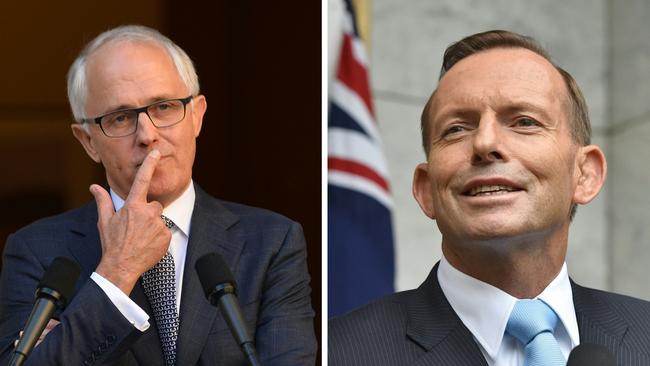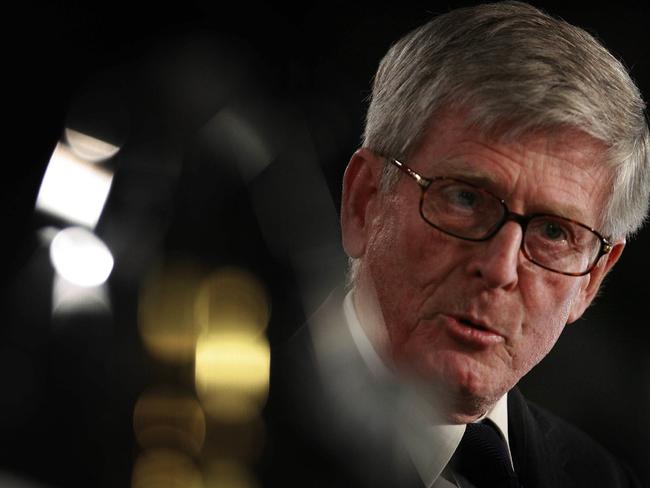Indigenous voice to parliament embodies ‘fair go’, paves practical way for reconciliation
It is an abiding insult to our Indigenous people that after all the blood, sweat and tears, it was dismissed out of hand by Malcolm Turnbull.

Rather, the voice can deliver meaningful outcomes for the health, education, safety and prosperity of Indigenous communities through a reform that protects the Constitution from judicial activism, completes the landmark changes of 1967, and recognises Indigenous Australians in our nation’s foundational document.
The voice exemplifies our visceral concept of a fair go and has sprung from decades of work – including by constitutional conservatives from the centre-right of politics collaborating with Indigenous leaders – and culminated in unprecedented Indigenous consensus around the Uluru Statement from the Heart in 2018.
It is an abiding insult to our Indigenous people that after all the blood, sweat, tears and years they put into the proposal, it was dismissed out of hand by then prime minister Malcolm Turnbull within days. But the power of the idea and the goodwill of Australians cannot be so easily rebuffed, nor can the fundamentally conservative nature of the model.
When Anthony Albanese used his election victory speech to proclaim his commitment to Indigenous recognition and a voice enshrined in the Constitution, he kept faith with earlier commitments and provided encouragement to many supporters of the voice. But he also risked cloaking the idea in partisanship, claiming it for the green-left side of politics and thereby diminishing the prospect of the bipartisan endorsement that is essential for a referendum to succeed.
The idea does not belong to either side of politics. It is not ideological.
Nor is the voice symbolic; it is practical. Our shameful performance in addressing the Aboriginal disadvantage that still stains this nation has not been so effective that we can continue doing what we have been doing and expect improvement.
It is implausible to argue that this national challenge can be met without representative input from Indigenous people themselves. If domestic violence, substandard education, poor health, substance abuse and scant employment opportunities are the blights that manifest themselves in different ways in disparate communities, then the practical remedies must spring, in large part, from grassroots experience and input from those communities.
If the voices of Indigenous people are properly heard, it must increase the likelihood of better outcomes. Apart from being fair and polite, consultation must help.
Governments of both persuasions have conceded this point in recent decades by appointing Indigenous advisory bodies – only they have been ad hoc and hand-picked rather than truly representative. If consulting Indigenous Australians is worthwhile then it should be done properly, with Indigenous people deciding who represents them.

In these pages and elsewhere some conservatives have been willing to oppose this idea on principle, even before the Albanese government’s Indigenous Australians Minister Linda Burney has come up with a concrete proposal detailing the shape of the voice or the proposed constitutional amendment. It would be a great shame for political parties or the public to lock themselves into positions before all this is known and a proper public debate unfolds.
Perhaps the most prevalent, damaging, and deceptive critique of the voice is that it splits the nation on race. This is a perverse argument, dressing up a reform aimed at removing racial discrimination and disadvantage as divisive.
We cannot close the gap – the difference in life outcomes between Indigenous and non-Indigenous Australians – without recognising race. Race has been in the Constitution from the start, and the Constitution already gives the federal government the power to make laws specifically for Aboriginal people – that was the power the nation backed in the 1967 referendum.
A change that adds an obligation to consult Indigenous Australians when making laws about their welfare (that is, a voice) would unite the nation rather than divide it. It would demonstrate and guarantee fairness.

The design and functions of the voice would be legislated and could be changed anytime at the whim of parliament. But the constitutional reference would give Indigenous Australians an assurance that they would always be consulted on their issues – so it would deliver justice and ongoing co-operation in a practical step forward for reconciliation.
To put all this into perspective it is worth imagining this had been proposed as part of the 1967 referendum – that the Constitution was to be amended so the federal government would have the power to make laws about Indigenous people but, in doing so, would be compelled to consult them. It is hard to imagine that such an addition would have been controversial; it would have seemed logical and still would have passed. In essence, that is all that is being advocated now.
For those hung up on racial divisions, we can dive into the semantics because at its core this not about race. Race is just the shorthand way we identify people who are the descendants of the original, dispossessed inhabitants of this land, who have certain rights under the Mabo decision, and particular needs as a consequence of past injustices, regardless of their race.
Importantly, a voice would be only advisory; all power would rest, as ever, with the parliament. The scare campaign from Turnbull and Tony Abbott about a “third chamber” of parliament, therefore, is erroneous and alarmist – there is no veto, no lawmaking or law-breaking capacity.
Barnaby Joyce employed the “third chamber” attack but later admitted it was wrong and apologised for using it. The recommendations of an Indigenous voice would carry great political weight, of course, but no constitutional power.
People on the conservative side of politics rightly eschew symbolism in favour of constructive outcomes. They should be reassured that the push for a voice was driven by a desire to achieve practical outcomes from the constitutional recognition process; Indigenous leaders argued that mere symbolic recognition would sell them short, while direct input into laws and policies concerning their welfare would deliver ongoing workable change.
Neither is this a progressive cause. Sure, the green left has jumped on board since the Uluru statement, but the hard yards occurred in the years leading up to that, when right-of-centre constitutional conservatives were working closely with Indigenous leaders such as Noel Pearson.
Rather than shun this reform, conservative politicians and commentators ought to embrace and shape it. Senator-elect Jacinta Nampijinpa Price, for instance, could help to counter the emotionalism of the left and use her lifelong experience to ensure the focus is always on the practical.
The Coalition under Peter Dutton and David Littleproud must be cognisant of the work their own government conducted to design a series of regional voices feeding into a national voice to ensure grassroots Indigenous communities have direct input into laws and policies directed at their welfare. (I was one of a handful of non-Indigenous people involved in that work.) So, already, the right-of-centre parties have embraced the practical idea of a voice formed under an act of Parliament – all that is left for them to agree it should be enshrined in the Constitution.
So let us take stock. Australians supported the granting of federal powers for Indigenous affairs in 1967; both sides of politics have seen fit to appoint Indigenous advisory bodies; all sides of politics support constitutional recognition; Indigenous leaders now say recognition can happen only with a voice; and the Coalition did the detailed work and was prepared to legislate local, regional and national voices. The only missing element of consensus is the constitutional hook for the voice.

When I joined regional consultation meetings for the voice proposal, I was struck by how much store people in Indigenous communities placed in the question of constitutional enshrinement. They wanted a voice but believed that without a constitutional reference it might be ephemeral – weary of promises, they were adamant a voice would mean little unless it was permanent, guaranteed in the Constitution. This is not a radical idea. Former High Court chief justice Murray Gleeson made a landmark speech in 2019 that should reassure conservatives: “A proposal that the Constitution should provide for parliament to design, establish, and determine from time to time the make-up and operations of a body to represent Indigenous people, with a specific function of advising about the exercise of that power (to make laws for Indigenous people), hardly seems revolutionary.”
He also demolished the arguments about division: “The division between Indigenous people and others in this land was made in 1788. It was not made by the Indigenous people. The race power in the Constitution is now used in practice to make special laws for them. The object of the proposal is to provide a response to the consequences of that division.”
Undoubtedly there will be nods to symbolism from time to time as we seek to redress the injustices of the past. Conservatives need to ensure their rational approach is not derailed by a kneejerk effort to reject that emotionalism.
Better that they involve themselves to ensure the voice is focused like a laser on workable outcomes. There are children missing school in remote communities, teenagers aimlessly unemployed in regional centres, and unlimited potential success stories in Indigenous communities who need their voices heard.




The proposal for an Indigenous voice to parliament is not racially divisive, does not confer special rights on Indigenous Australians, does not constitute a “third chamber” of parliament, and most certainly does not insert race into our Constitution. Nor is it a radical, leftist, or symbolic reform, emanating from the progressive side of politics.